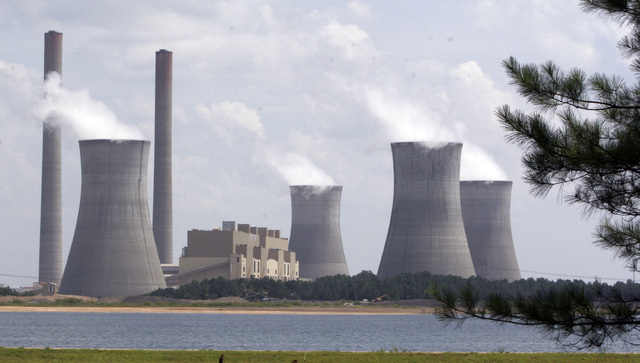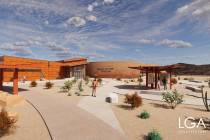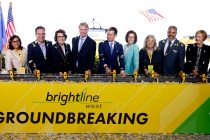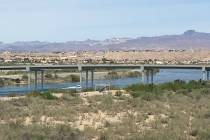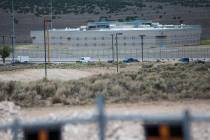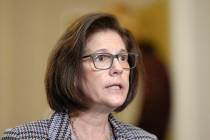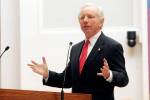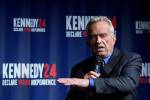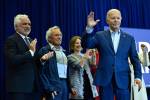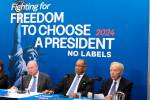Climate change becoming increasingly visible campaign issue in Nevada
Environmental groups have pumped more than $3 million into Nevada elections, investing money in ads and a ground game that will get canvassers and volunteers out knocking on doors statewide.
It’s a reflection in part of how climate change has become an increasingly visible issue, whether it’s drought-stricken farmland in California, increased wildfires, or rising sea levels, environmental advocates say.
The spending, from groups that include NextGen Climate and the League of Conservation Voters, is supporting Democratic presidential nominee Hillary Clinton and Catherine Cortez Masto, the Democratic candidate for Nevada’s open U.S. Senate seat.
“We’re organized to try to promote voter-to-voter contact for millennials around energy and climate,” Tom Steyer, a businessman and president of NextGen Climate, said in an interview with the Review-Journal. “The idea is to engage millennials to get them to talk to each other about climate issues, clean energy issues and the polices around them and the results of doing the right thing or wrong thing.”
This is the first presidential race for NextGen Climate, which was founded by Steyer in 2013 and has a presence on nine college campuses in the state. The group is involved in more than 200 college campuses nationwide.
The group’s polling of millennial voters between the ages of 18 and 34 in Nevada and other battleground states found that clean energy is a top issue. For example, 83 percent of millennials polled said prioritizing the nation’s transition to clean energy would make them more likely to support Clinton over Donald Trump, the Republican presidential nominee.
NextGen Climate is aiming to turn that sentiment into actual votes from millennial voters.
“Ultimately, unless it’s a voting issue, your likelihood of getting any progress in the United States is low,” Steyer said.
Nevada is one of seven states where NextGen Climate has a field operation and staff. The others are New Hampshire, Illinois, Ohio, Pennsylvania, Colorado and Iowa.
“I think in terms of the Republicans, we have seen Republican voters move a long way on this issue,” he said. “… But we have not seen Republican candidates move that way in any kind of significant way.”
The organization’s super PAC, NextGen Climate Action Committee, has spent $408,106.89 in Nevada so far, most of it on digital advertising.
Climate change as an issue on the presidential campaign trail has a backstory.
In Trump’s case, a tweet he made in 2012 continues to draw scoffs from climate change advocates.
“The concept of global warming was created by and for the Chinese in order to make U.S. manufacturing non-competitive,” Trump tweeted in 2012.
Trump has said climate change is a “hoax” on other occasions.
That’s turning into ammunition for environmental advocates backing Clinton.
“Probably the most dramatic thing is the difference in the candidates on climate,” said Michael Brune, executive director of the Sierra Club. “You have in Secretary Clinton someone who has made this a priority, someone who has talked in great detail about her commitment to clean energy and reducing our reliance on fossil fuels, and, of course Donald Trump takes great delight in ignoring climate science and saying this was a hoax created by the Chinese.”
The Sierra Club, an environmental advocacy group that began in 1892, is also putting muscle into the Nevada elections, one of the top three states it’s focusing on along with New Hampshire and North Carolina.
Efforts will include mailers and canvassing with California volunteers bused in to knock on doors, Brune said, adding the group will be mobilizing volunteers throughout the state.
“Without a doubt, we’ll have more volunteers engaged in the state than ever before,” he said.
Climate change also might be an issue brought up during the upcoming presidential debates. “It’s certainly something we would hope would be a question from the mediators,” said Clay Schroers, national campaign director of the LCV Victory Fund.
“There’s a clear dividing line between the candidates. Trump has called it a hoax from the Chinese and Hillary has pledged to tackle the issue,” Schroers said. “Voters are judging these candidates on whether or not they at least have a baseline.”
But in the Democratic primary, he said, climate change was an issue both Clinton and Bernie Sanders made strong pledges to tackle.
“I think she realizes that not only she feels strongly about it, but voters know where she stands, particularly younger voters, millennial voters. … These are effects that people are realizing are not 40 years down the line.”
The League of Conservation Voters, and its associated LCV Victory Fund, have put a combined $2.6 million into Nevada for efforts that include canvassing and advertising.
“But there’s no doubt that the Nevada program will be among our largest,” Schroers said. “We are really putting in a ton of work. We have field programs, candidate programs running in both the Senate and the presidential race.”
Environmental groups, including the league, are supporting Cortez Masto, who has a stance of investing more in renewable energy technology to create jobs, including in the wind, solar and geothermal sectors.
The campaign for her Republican opponent in the Senate race, U.S. Rep. Joe Heck, points to his record, which includes advocating for grandfathering in Nevadans with rooftop solar so they would get lower rates and pushing for legislation to make permitting easier for renewable energy projects on public lands.
Contact Ben Botkin at bbotkin@reviewjournal.com or 702-387-2904. Follow @BenBotkin1 on Twitter.
RELATED
Climate change threatens American pika in Nevada, West
Climate change will increase evaporation of Colorado River
Retired admiral looks to sink climate change threats



